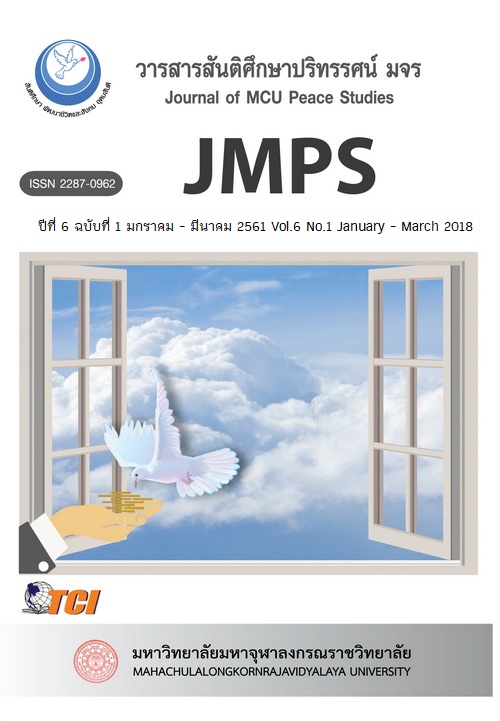The Application Model of Bhikkhu Pātimokkha for Management of Buddhist-Oriented Organization
Main Article Content
บทคัดย่อ
This qualitative research has 3 objectives which are: (1) to study the goals and development of Bhikkhu Pãtimokkha in Theravada Buddhism; (2) to study the significant essence of Bhikkhu Pãtimokkha for use as a tool for Sangha Administration; and (3) to propose the guidelines for applying Bhikkhu Pãtimokkha for use as a tool for sangha administration and organization administration. It is fulfilled by the methods of documentary research and focus group discussion.
The research results indicate that Bhikkhu Pãtimokkha, a set of 227 disciplinary rules for monks, has the essence in alignment with the threefold training to be applied for use as a practical framework for implementing the management of buddhist-oriented organization with the aim to create morality, ethics, and unity among members of organizations. This way of management is in compliance with the method of sangha administration based on Dhamma and Vinaya, which is judged as the best and most effective management method initiated by the Lord Buddha. It presents that the social behaviors following the practical framework of Bhikkhu Pãtimokkha are definitely conducted on the basis of precepts (sila) that produce behavioral virtues in 3 dimensions namely right speech (sammā vācā), right action (sammā kammanta), and right livelihood (sammā ājīva).
The research reveals that the application model of Bhikkhu Pātimokkha for management of buddhist-oriented organization expected to consequently bear fruits of morality, ethics and unity among organizational members is composed of (1) application of principles of Bhikkhu Pãtimokkha to create a firm foundation of organizational structure; (2) application of essence of Bhikkhu Pãtimokkha for human management to create their morality; and (3) application of methods of Bhikkhu Pãtimokkha as a tool for management of organizational work that initiates ethics and unity. The intended end result is the buddhist-oriented organization that highly relies on precepts (sila), is aware of public benefits and unity for its work implementation and management.
Keywords: Bhikkhu Pãtimokkha, organization management, buddhist-oriented organization
Article Details
ทัศนะและความคิดเห็นที่ปรากฏในบทความในวารสาร ถือเป็นความรับผิดชอบของผู้เขียนบทความนั้น และไม่ถือเป็นทัศนะและความรับผิดชอบของกองบรรณาธิการ ยินยอมว่าบทความเป็นลิขสิทธิ์ของวารสาร


